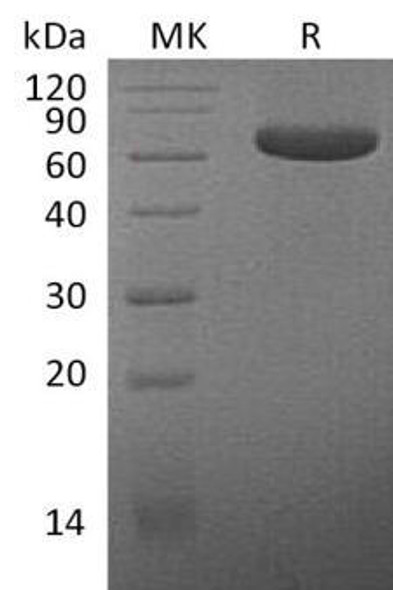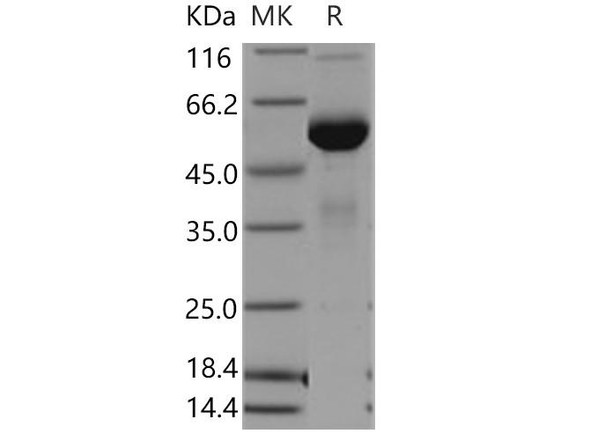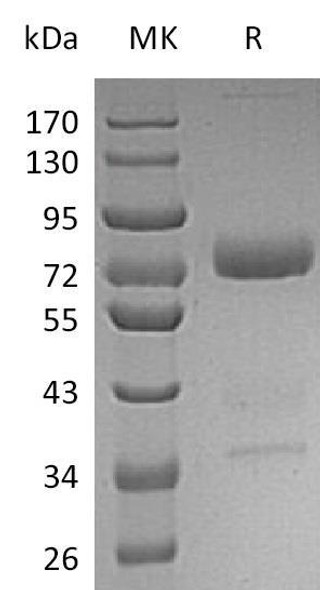Description
| Product Name: | Human MSLN/Mesothelin Recombinant Protein (His tag) |
| Product Code: | RPES5506 |
| Size: | 20µg |
| Species: | Human |
| Expression Host: | E.coli |
| Synonyms: | Megakaryocyte potentiating factor, mesothelin, Pre-pro-megakaryocyte-potentiating factor, soluble MPF mesothelin related protein, CAK1, MPF, MSLN, SMR, CAK1, CAK1 antigen |
| Mol Mass: | 6.27 kDa |
| AP Mol Mass: | 10 kDa |
| Tag: | N-His |
| Purity: | > 95 % as determined by reducing SDS-PAGE. |
| Endotoxin Level: | Please contact us for more information. |
| Bio Activity: | Testing in progress |
| Sequence: | Cys 302-Lys 359 |
| Accession: | Q13421 |
| Storage: | Generally, lyophilized proteins are stable for up to 12 months when stored at -20 to -80°C. Reconstituted protein solution can be stored at 4-8°C for 2-7 days. Aliquots of reconstituted samples are stable at < -20°C for 3 months. |
| Shipping: | This product is provided as lyophilized powder which is shipped with ice packs. |
| Formulation: | Lyophilized from sterile PBS, pH 7.4. Normally 5 % - 8 % trehalose, mannitol and 0.01% Tween80 are added as protectants before lyophilization. Please refer to the specific buffer information in the printed manual. |
| Reconstitution: | Please refer to the printed manual for detailed information. |
| Background: | Mesothelin, also known as CAK1 and ERC, is derived from a 70 kDa precursor that also includes Megakaryocyte Potentiating Factor (MPF). The 70 kDa precursor is expressed on the cell surface where it is cleaved at a dibasic proteolytic site to release the 32 kDa glycosylated MPF. MPF is a cytokine that potentiates IL-3 induced megakaryocyte colony formation. The term Mesothelin refers to the 40 kDa glycosylated protein which remains attached to the cell surface via a GPI linkage. Alternate splicing generates additional Mesothelin isoforms that have either an eight amino acid insertion following Ser408 or a substituted C terminal region with no GPI anchor. This recombinant human Mesothelin lacks the 8 aa insertion, and within aa 296-580 it shares 59% sequence identity with mouse and rat Mesothelin. Mesothelin is normally expressed on mesothelial cells in the pleura, pericardium, and peritoneum as well as in the developing and postnatal pancreas. It is up regulated in mesotheliomas and a range of carcinomas and adenomas. Mesothelin promotes tumor cell proliferation, migration, anchorage-independent growth, and tumor progression. It is coexpressed with the tumor antigen CA125/MUC16 on advanced ovarian adenocarcinomas and interacts with this molecule to support cell adhesion. A soluble form of Mesothelin is released from tumor cells into the serum or tissue effusions. |






